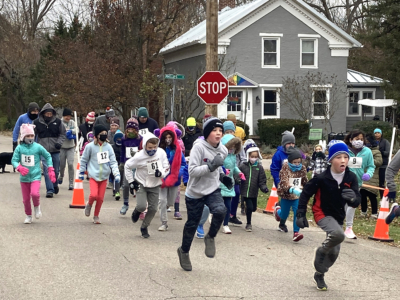Judge for Struewings, again
- Published: April 18, 2013
A Greene County Common Pleas Court judge last week ruled in favor of Kenneth and Betheen Struewing in their case against the Village of Yellow Springs. The ruling upholds a decision rendered by a Greene County magistrate last April that the plaintiff’s property easement is valid, granting them one free Village water and sanitary sewer tap for their property on Hyde Road, which lies outside Village limits.
The Village has until the end of April to appeal the case to the second district court, according to Village attorney Terry Fague, of Coolidge Wall law firm. According to Village Manager Laura Curliss, the Village is likely to discuss the case in executive session at its next meeting on Monday, April 15, to decide its next steps.
The Struewings sued the Village in 2009 for refusing to provide water and sewer access to the property, which they purchased from former Village Manager Howard Kahoe’s estate. The Struewings hold an easement that Kahoe granted to the Village in 1963 to build Village sewer and water lines across his property to serve the southern population of the village. The Village has argued that because the easement is self-serving, there is no record that the Village approved it, and it was filed 11 years after it was granted, the easement is invalid.
But Judge Michael Buckwalter in his final ruling found that “the Kahoe easement is valid and enforceable.” According to the terms of the easement, the Village is obliged to grant one free water and sewer tap to each of two Kahoe properties on Hyde and Spillan roads, one of which the Struewing’s own.
During the course of the lawsuit, Ken Struewing, a home builder, sold the home on the property and because of the Village’s denial for a water tap, dug a well on the property, which cost $10,244. The judge also upheld the court’s earlier ruling that the Village compensate the Struewings for the cost of the well.
According to Curliss, the judge’s final decision is “frought with lack of clarity.” The Village filed objections to the magistrate’s ruling, which were based on the invalid nature of the easement as well as the fact that no water line was ever installed along the Struewing property, and therefore the Village shouldn’t owe the property owner a water tap. Buckwalter does “modify” the magistrate’s decision, agreeing that water lines were not installed on the Struewing’s property. But he maintains that the Village still owes the Struewings both water and sewer taps for their property.
Also complicating the ruling, according to Curliss, is the fact that the Village last July approved an ordinance requiring that any property receiving Village utilities must lie within village limits. The policy would require that the Struewing property first be annexed into the village before it could tap into Village water.
“Though the court was not asked to and did not address these other issues, other law still applies,” Curliss said this week. “We do not extend utilities outside the village.”
Also problematic is the language in the easement that allows the property owners “the right to make further taps,” which neither the magistrate nor the judge addresses at all in their rulings. Curliss called “unlimited taps” a “logical impossibility.”
The Struewing’s property consists of 42 acres that abut the village boundary on Spillan Road. The village originally denied Struewing the taps due to its policy to not extend Village water and sewer outside its current borders. Magistrate Raymond Dundes in his decision last year remarked, “It is clear that the Village of Yellow Springs would like to continue to control the growth of the village by regulating the extensions of utilities outside the corporate limits.”
While the Struewings are only allowed two Village taps, they could potentially use them to serve a larger development on the property, currently located in Miami Township and zoned agricultural. But Struewing has already said that he does not plan to develop the property, especially since he owns a property contiguous to it that’s already located inside the Village limits and platted for housing. He tried to develop that property twice before, but the Village denied the plans both times.
To date, the Village has spent $98,000 on attorney fees for the Struewing case. Though they have not yet decided how to move forward, Curliss said that the bulk of the cost was spent in 2011 gathering evidence to prepare for the trial. Because appeals consist mostly of writing briefs, the cost of an appeal is usually much lower. She estimated that an appeal generally costs under $10,000 and takes significantly less time than the initial legal course.
The Yellow Springs News encourages respectful discussion of this article.
You must login to post a comment.
Don't have a login? Register for a free YSNews.com account.
Parkinsons.jpg)













No comments yet for this article.